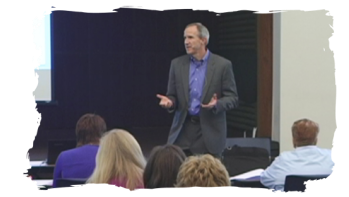The Gold Standard for Customer ServiceBy Wes Bleed
Most of us know the Golden Rule: "Do unto others as you would have them do unto you." It's guided us for centuries and it still makes sense today. Or does it? We agree it's important to treat others with kindness and respect. We agree that treating others as we want to be treated smooths over differences and helps prevent relationships from unraveling. We try our best, and yet it doesn't seem to be enough. Could it be because we've missed the real essence of Christ's command? |
|
If we're honest with ourselves, we realize we tend to go only so far in how we treat others. Dr. Henry Cloud points this out in his book, "Nine Things You Simply Must Do to Succeed in Love and Life." We think 50/50 is the right approach. "I'll go half-way," we think, while expecting the other person to go the other 50 percent. The problem is that relationships are almost never 50/50. Even if they were, we would never see them that way. And that's the point.
We have a perception problem. We always see the effort we put forth, rarely the effort from the other person. So, we tend to think we have managed to do our 50 percent, whether we really have or not. The more effective approach is to go beyond 50/50, to go the "extra mile." It's only then that we truly treat people as we want to be treated. That's because deep down inside, each of us thinks we really deserve better. We want someone to do more for us than we think is fair and equitable.
If you disagree, rethink how some of your friendships have flamed out. What likely occurred was that one of you got tired of feeling like the giver. He or she likely felt they weren't being treated anywhere near the way they wanted. Now, translate that to marriage. Think about how impossible a 50/50 approach really is. A rigid quota system almost always leaves the other person thinking he's done all the heavy lifting. Doing more than your "fair share" shows your spouse how much you value him or her, and helps to keep the relationship vibrant.
Take it to the business world. Companies that succeed are not just fulfilling perfunctory forms of customer service, but are over-extending themselves again and again to give the customer what they would want to have if they were in the customer's shoes. Refund? No problem. Take it back? Sure thing, and we'll make sure we help you find the right size. Did we mention we'll take 10 percent off your next purchase?
Managers who can motivate departments and whole companies do it by "doing unto others" in ways that create a culture of success and opportunity. They don't just bark out commands or fire off memos. They figure out what the employees need to have a sense of purpose, and then go about trying to help them get it.
Every so often we see a new list of the top businesses in the country to work for. The list usually includes things like flexible hours and benefits. What's probably not mentioned is the intangible of how the employees feel they're treated. If you could measure that, you'd likely find a leader who is treating his or her employees better than he has to.
Three quick steps to refining the gold standard.
1. Ask - Ask enough questions to understand what the other person or the customer wants or expects. Then ask what you can do to meet and even exceed those expectations. Of course, you need to listen to the responses.
2. Act - You need to take action in order for the other person or customer to truly feel as though they've been treated well. Just thinking about it misses the whole point of the "DO unto others." You have to "do" something. So, go ahead and DO it.
3. Amaze - If you're seeing life through the other person's point of view, you can make a pretty good guess about what kind of response will be good, great or amazing. Why settle for good when you can be amazing? Have you amazed anyone lately?
"Do unto others" has been the gold standard for 2 thousand years. The question is, do you really understand the true impact of what it means? Don't just treat someone "good enough." Treat them "better than" what you think is necessary, because that's how you would want to be treated.
Looking for fresh ideas to put this kind of thinking to work at your organization? Have Wes custom design a presentation for you. Contact us at [email protected].
We have a perception problem. We always see the effort we put forth, rarely the effort from the other person. So, we tend to think we have managed to do our 50 percent, whether we really have or not. The more effective approach is to go beyond 50/50, to go the "extra mile." It's only then that we truly treat people as we want to be treated. That's because deep down inside, each of us thinks we really deserve better. We want someone to do more for us than we think is fair and equitable.
If you disagree, rethink how some of your friendships have flamed out. What likely occurred was that one of you got tired of feeling like the giver. He or she likely felt they weren't being treated anywhere near the way they wanted. Now, translate that to marriage. Think about how impossible a 50/50 approach really is. A rigid quota system almost always leaves the other person thinking he's done all the heavy lifting. Doing more than your "fair share" shows your spouse how much you value him or her, and helps to keep the relationship vibrant.
Take it to the business world. Companies that succeed are not just fulfilling perfunctory forms of customer service, but are over-extending themselves again and again to give the customer what they would want to have if they were in the customer's shoes. Refund? No problem. Take it back? Sure thing, and we'll make sure we help you find the right size. Did we mention we'll take 10 percent off your next purchase?
Managers who can motivate departments and whole companies do it by "doing unto others" in ways that create a culture of success and opportunity. They don't just bark out commands or fire off memos. They figure out what the employees need to have a sense of purpose, and then go about trying to help them get it.
Every so often we see a new list of the top businesses in the country to work for. The list usually includes things like flexible hours and benefits. What's probably not mentioned is the intangible of how the employees feel they're treated. If you could measure that, you'd likely find a leader who is treating his or her employees better than he has to.
Three quick steps to refining the gold standard.
1. Ask - Ask enough questions to understand what the other person or the customer wants or expects. Then ask what you can do to meet and even exceed those expectations. Of course, you need to listen to the responses.
2. Act - You need to take action in order for the other person or customer to truly feel as though they've been treated well. Just thinking about it misses the whole point of the "DO unto others." You have to "do" something. So, go ahead and DO it.
3. Amaze - If you're seeing life through the other person's point of view, you can make a pretty good guess about what kind of response will be good, great or amazing. Why settle for good when you can be amazing? Have you amazed anyone lately?
"Do unto others" has been the gold standard for 2 thousand years. The question is, do you really understand the true impact of what it means? Don't just treat someone "good enough." Treat them "better than" what you think is necessary, because that's how you would want to be treated.
Looking for fresh ideas to put this kind of thinking to work at your organization? Have Wes custom design a presentation for you. Contact us at [email protected].

